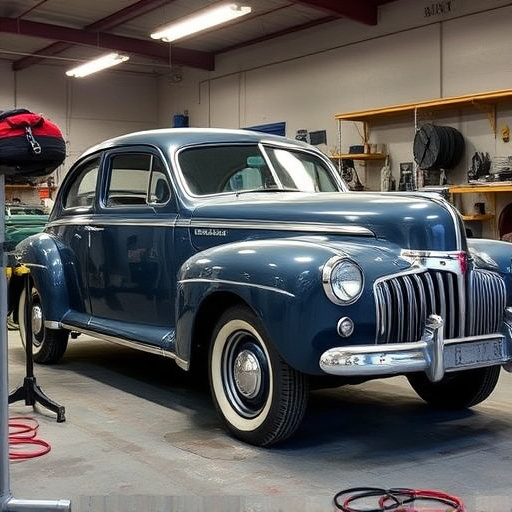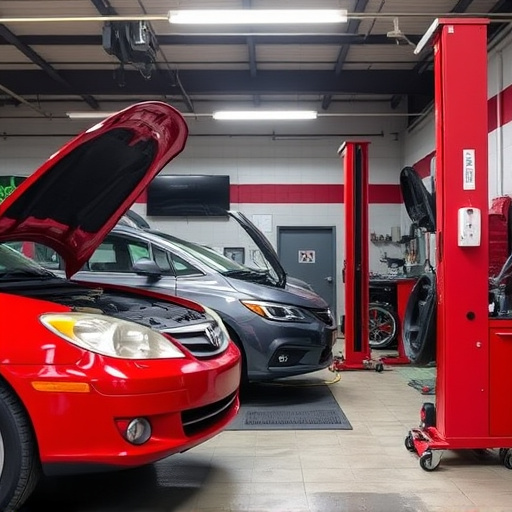Mercedes climate control systems, despite their reputation for precision, can develop issues over time due to factors like failed temperature sensors, refrigerant leaks, or glitches in the control module. Early diagnosis is vital to prevent further damage. Symptoms include unusual noises, inefficient cooling/heating, lack of airflow, persistent leaks, and odd smells. Regular maintenance and prompt attention to warning signs are key to ensuring optimal performance; ignoring these issues may lead to costly Mercedes climate control repair.
Understanding the ins and outs of Mercedes climate control repair is essential for any car owner aiming to maintain comfort and efficiency. This comprehensive guide tackles common issues plaguing these sophisticated systems, from insufficient cooling or heating to unpredictable temperature regulation. We demystify diagnostic processes using modern scanners and manual troubleshooting techniques, providing a step-by-step approach for replacing crucial components like sensors and actuators. Learn how to optimize your Mercedes’ climate control system post-repair for enhanced performance and extended lifespan.
- Assessing Common Mercedes Climate Control Issues
- – Identifying symptoms of faulty climate control systems
- – Common causes of problems like insufficient cooling or heating
Assessing Common Mercedes Climate Control Issues
Mercedes climate control systems are renowned for their precision and comfort, but like any complex machinery, they can encounter issues over time. Assessing common problems is the first step in effective Mercedes climate control repair. One frequent issue is the failure of temperature sensors, which can lead to inaccurate readings and uneven heating or cooling. Another widespread problem involves the refrigerant system, where leaks or low refrigerant levels may cause the air conditioning to malfunction. These issues often manifest as a lack of cool air or warm air output, despite the settings remaining unchanged.
Additionally, the control module, responsible for interpreting user preferences, might develop glitches, resulting in unexpected changes in temperature settings or even complete failure to respond to inputs. It’s crucial to note that proper diagnosis is key; incorrect repairs can lead to further car damage repair and unnecessary expenses. A meticulous evaluation process considers various factors, including component age, usage patterns, and environmental conditions, to pinpoint the exact cause of any malfunction, ensuring efficient auto body repairs or more specialized services like paintless dent repair when needed.
– Identifying symptoms of faulty climate control systems

If your Mercedes’ climate control system isn’t functioning optimally, it can be frustrating, especially during extreme weather conditions. Understanding common symptoms is the first step in identifying a potential need for Mercedes climate control repair. Some clear signs include unusual noises coming from the AC vents, warm air instead of cold when the system is engaged, or a lack of airflow despite the setting being on high. The temperature gauge might also not be reflecting the actual cabin temperature, indicating an issue with sensors or the control module.
In addition to these comfort-related issues, there could be underlying problems that require professional attention. For instance, a persistent leak within the system can lead to water damage and even mold growth inside your vehicle, which is more than just an uncomfortable situation—it poses serious health risks. Similarly, if you notice odd smells coming from the AC vents, it might indicate a contaminated air filter or a problem with the refrigeration cycle, requiring specialized Mercedes climate control repair services rather than a quick fix for issues like car dent repair or hail damage repair.
– Common causes of problems like insufficient cooling or heating
Mercedes climate control systems are known for their precision and comfort, but like any complex mechanism, they can encounter issues over time. Common problems include insufficient cooling or heating, which could be due to a variety of factors. One of the primary causes is a malfunctioning temperature sensor, which fails to accurately read the cabin temperature, leading to incorrect adjustments in the climate control unit. Malfunctioning or dirty HVAC (Heating, Ventilation, and Air Conditioning) components can also disrupt the optimal airflow, resulting in uneven heating or cooling throughout the vehicle.
Another common issue is a leaky air conditioner, often caused by worn-out seals or an undercharged refrigerant system. This not only reduces the efficiency of the climate control but can also lead to high energy bills for car owners. Regular auto maintenance and prompt attention to warning signs, such as musty smells, strange noises, or sudden temperature fluctuations, are essential in ensuring optimal performance of your Mercedes’ climate control system.
Understanding the fundamentals of Mercedes climate control repair is essential for any car owner. By recognizing common issues and their underlying causes, such as insufficient cooling or heating, you can efficiently address problems. Armed with this knowledge, you’ll not only save on maintenance costs but also ensure your vehicle provides a comfortable driving experience. For more in-depth guidance, consider consulting professional mechanics specializing in Mercedes climate control repair.













